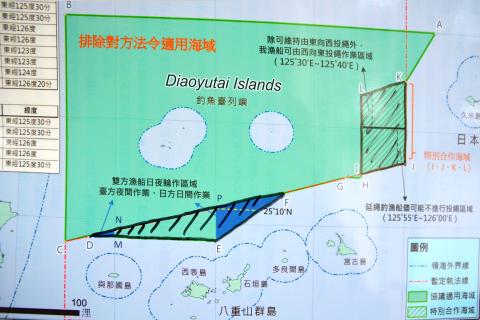The Ministry of Foreign Affairs (MOFA) yesterday pledged to safeguard Taiwanese fishermen’s interests at an upcoming meeting with Japan, amid demands by Japanese fishery associations that the boundaries set by a historic agreement between the two nations be narrowed.
“Regarding Okinawa fishery associations’ demands that Japanese authorities re-examine the areas in which the 2013 Taiwan-Japan fishery agreement are applicable, the Japanese government has yet to include the issue on the agenda of the fifth meeting of the Taiwan-Japan fishing commission from March 2 to March 4 in Taipei,” ministry spokesperson Eleanor Wang (王珮玲) said.
Wang said that if Japan brings up the issue during the meeting, Taiwan’s representatives would argue strongly for the nation’s interests and ask their Japanese counterparts to consider the achievements that have been made since the agreement’s signing.

Photo: Chu Tse-wei, Taipei Times
“At the moment, such demands are made only by local fishery groups in Japan and do not reflect the nation’s official stance,” Wang said, urging concerned parties to handle the matter in a rational manner.
Wang made the remarks one day after representatives of the Yilan-based Suao Fishermen’s Association and other fishery groups urged the government to stand up for their rights during the meeting, or they would mobilize fishermen to surround the disputed Diaoyutai Islands (釣魚台) as a form of protest.
The Taiwan-Japan fishing commission was established after the two nations in April 2013 signed a pact on fishing rights in the East China Sea near the Diaoyutais, which Japan calls the Senkaku Islands.
Under the terms of the agreement, Taiwanese and Japanese boats can operate freely in a 74,300km2 area around the archipelago.
An amendment to the pact was passed last year, allowing Taiwanese and Japanese fishing boats to take turns operating in the area north of the Yaeyama Islands and maintain a 4 nautical mile (7.4km) distance between each boat while fishing.
Wang said the agreement has established an institutionalized negotiation mechanism between Taipei and Tokyo, allowing both sides to jointly explore fishery resources and their fishermen to operate in peace.
“It is a concrete embodiment of [President Ma Ying-jeou’s (馬英九)] East China Sea peace initiative and has set a successful precedent for peaceful resolution of conflicts,” Wang said.

ENDEAVOR MANTA: The ship is programmed to automatically return to its designated home port and would self-destruct if seized by another party The Endeavor Manta, Taiwan’s first military-specification uncrewed surface vehicle (USV) tailor-made to operate in the Taiwan Strait in a bid to bolster the nation’s asymmetric combat capabilities made its first appearance at Kaohsiung’s Singda Harbor yesterday. Taking inspiration from Ukraine’s navy, which is using USVs to force Russia’s Black Sea fleet to take shelter within its own ports, CSBC Taiwan (台灣國際造船) established a research and development unit on USVs last year, CSBC chairman Huang Cheng-hung (黃正弘) said. With the exception of the satellite guidance system and the outboard motors — which were purchased from foreign companies that were not affiliated with Chinese-funded

PERMIT REVOKED: The influencer at a news conference said the National Immigration Agency was infringing on human rights and persecuting Chinese spouses Chinese influencer “Yaya in Taiwan” (亞亞在台灣) yesterday evening voluntarily left Taiwan, despite saying yesterday morning that she had “no intention” of leaving after her residence permit was revoked over her comments on Taiwan being “unified” with China by military force. The Ministry of the Interior yesterday had said that it could forcibly deport the influencer at midnight, but was considering taking a more flexible approach and beginning procedures this morning. The influencer, whose given name is Liu Zhenya (劉振亞), departed on a 8:45pm flight from Taipei International Airport (Songshan airport) to Fuzhou, China. Liu held a news conference at the airport at 7pm,

GRIDLOCK: The National Fire Agency’s Special Search and Rescue team is on standby to travel to the countries to help out with the rescue effort A powerful earthquake rocked Myanmar and neighboring Thailand yesterday, killing at least three people in Bangkok and burying dozens when a high-rise building under construction collapsed. Footage shared on social media from Myanmar’s second-largest city showed widespread destruction, raising fears that many were trapped under the rubble or killed. The magnitude 7.7 earthquake, with an epicenter near Mandalay in Myanmar, struck at midday and was followed by a strong magnitude 6.4 aftershock. The extent of death, injury and destruction — especially in Myanmar, which is embroiled in a civil war and where information is tightly controlled at the best of times —

Taiwan was ranked the fourth-safest country in the world with a score of 82.9, trailing only Andorra, the United Arab Emirates and Qatar in Numbeo’s Safety Index by Country report. Taiwan’s score improved by 0.1 points compared with last year’s mid-year report, which had Taiwan fourth with a score of 82.8. However, both scores were lower than in last year’s first review, when Taiwan scored 83.3, and are a long way from when Taiwan was named the second-safest country in the world in 2021, scoring 84.8. Taiwan ranked higher than Singapore in ninth with a score of 77.4 and Japan in 10th with